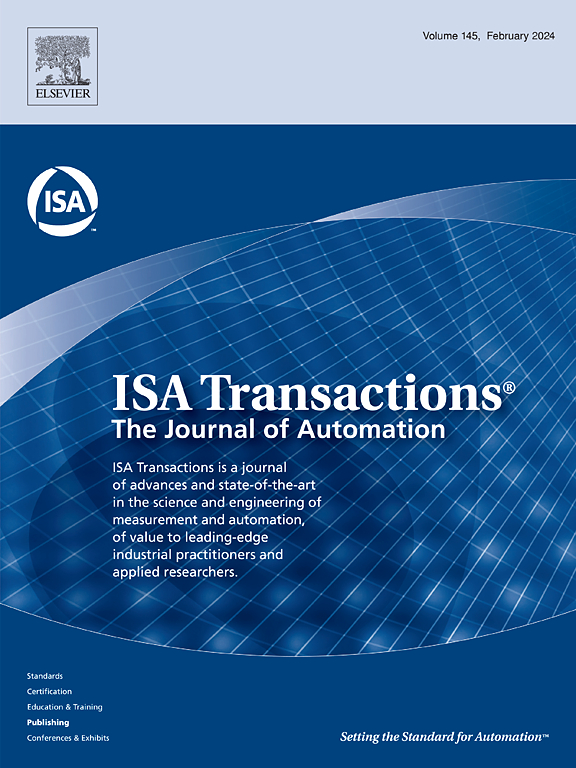基于广义比例积分扩展状态观测器的全驱动系统控制器设计
IF 6.3
2区 计算机科学
Q1 AUTOMATION & CONTROL SYSTEMS
引用次数: 0
摘要
本文提出了一种基于扩展状态观测器的反馈控制器,适用于完全致动系统。首先,设计了一个广义比例积分观测器来同时估计状态和干扰。利用线性参数变化方法和凸性原理,给出了一个线性矩阵不等式条件,从而得到观测器增益。其次,在全作用特性和估计状态的基础上,设计一个反馈控制器,利用估计的扰动来补偿系统扰动,使闭环系统的所有状态均匀地最终有界。此外,如果干扰是恒定的或缓慢时变的,则闭环系统的观测误差和状态都是指数收敛的。本文通过两个实例说明了所提方法的有效性和实用性。仿真结果表明,估算的扰动能以相对较小的误差跟随真实值,因此用估算值补偿系统扰动能有效降低闭环系统状态的最终界限。本文章由计算机程序翻译,如有差异,请以英文原文为准。
Generalized proportional–integral extended state observer-based controller design for fully actuated systems
In this paper, a feedback controller based on the extended state observer is proposed for fully actuated systems. First, a generalized proportional–integral observer is designed to estimate states and disturbances simultaneously. Using the linear parameter varying approach and the convexity principle, a linear matrix inequality condition is given to obtain the observer gains. Second, on the basis of the full-actuation property and the estimated states, a feedback controller, utilizing estimated disturbances to compensate for system disturbances, is designed to make all the states of the closed-loop system uniformly ultimately bounded. In addition, if disturbances are constant or slow time-varying, the observation errors and the states of closed-loop system are all exponentially convergent. Two illustrations are provided to show the validity and practicality of the proposed approach. Simulation results show that the estimated disturbances can follow the true values with relatively small errors, so compensating the system disturbances with estimated values can effectively reduce the ultimate bounds of states of the closed-loop system.
求助全文
通过发布文献求助,成功后即可免费获取论文全文。
去求助
来源期刊

ISA transactions
工程技术-工程:综合
CiteScore
11.70
自引率
12.30%
发文量
824
审稿时长
4.4 months
期刊介绍:
ISA Transactions serves as a platform for showcasing advancements in measurement and automation, catering to both industrial practitioners and applied researchers. It covers a wide array of topics within measurement, including sensors, signal processing, data analysis, and fault detection, supported by techniques such as artificial intelligence and communication systems. Automation topics encompass control strategies, modelling, system reliability, and maintenance, alongside optimization and human-machine interaction. The journal targets research and development professionals in control systems, process instrumentation, and automation from academia and industry.
 求助内容:
求助内容: 应助结果提醒方式:
应助结果提醒方式:


